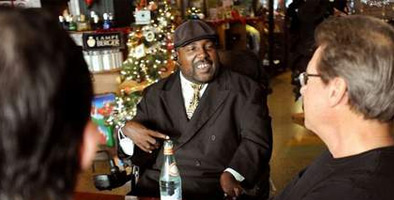
Paul Guzzo | Tribune Staff | December 21, 2013
The first thing you notice about Arizona Jenkins is the wheelchair. He has used one since childhood because of the cerebral palsy that paralyzes the left side of his body.
The next thing you notice is the grin – so earnest, so toothy, so ever-present it seems to lift him out of the chair so he can get about his business of helping other people.
Jenkins is a champion for people with disabilities: He’s a member of a committee that helps the bus system serve them better, head of his own small support and lobbying group, tireless in his work to mentor people one-on-one or before whole school classrooms by showing them what he can do with his own life. “Independence,” explains Jenkins, whose paralysis often requires him to repeat a sentence half a dozen times before he is understood. “I can hang out with the so-called normal people because I am independent.”
The rewards of helping other people explain some of the joy behind his smile. But there’s another source, somewhere in the playful, wicked banter around the table they keep for him at his favorite haunt: the dark and spacious King Corona Cigars cafe and bar in the heart of Ybor City. He can be found here late most mornings, trading wisdom with the boys – an eclectic mix of political operatives, academics, professionals and retirees. They argue sports, politics and religion, insulting one another all the while. No one is safe, not even Jenkins. They poke fun at his disheveled shirt collar, a shot they know gets under the skin of a man whose nicknames include “The Don Juan of Ybor” for his always-dapper attire. They mock him as “The King of Ybor,” a title he earned for knowing nearly everyone in the historic district where he’s lived his whole life and where he rules from a wheeled throne.
“His real throne is in the back!” quips one of the boys, pointing to the bathroom. “Don’t let him fool you with that kind smile,” advises Don Barco, King Corona Cigars owner and Jenkins’ longtime friend. “He dishes the insults out as much as he takes them.” With a visitor present, Jenkins sheepishly shakes his head no. But the grin betrays him.
To say the least, it isn’t pandering Jenkins expects at King Corona – none of the well-meaning, exaggerated consideration people extend to those with disabilities. He has special needs – help with grooming, for example, and he knows he’ll never play football with the guys. But for Jenkins, true independence means he doesn’t let the cerebral palsy define him. He doesn’t let it prevent him from doing the things he can do.
He can attend Tampa Bay Buccaneers games because he knows how to work the bus system. He can eat out at restaurants because he checks which ones are most convenient for wheelchairs. He can go to movies because he calls ahead to let the theater know where he and his group need to sit. He can go on a cruise because he gets hold of a map and plans his onboard moves.
Most important to him, he never lets his disability make him a burden on his friends. He will not have them look at him differently. “I’m not different,” he says. “All that is wrong with me is my left side of my body doesn’t work right.” His friends say that’s not exactly true. The heart is on the left side of the body.
Barco spoke of a customer who lost both his legs to a medical condition. Jenkins barely knew the man but helped him through the tough times. Friend Tony Alfonso, a retired pilot, has an uncle who had to give up driving because of his age and feared it would be the end of his social life. No one asked Jenkins to step in but he did, recording the uncle’s favorite activities and plotting out bus routes to get him there.
And his friend Al Fox, an outspoken advocate for normalization of relations with Cuba, said it was Jenkins who persuaded him to give his own special-needs daughter more freedom. “He told me to stop telling her what she can’t do,” Fox said. “He told me to let her live. I don’t admit to being wrong often, but Arizona was right and I was wrong. I had to let her live.”
Jenkins delivers the same help and advice he gives his friends to people and audiences across Hillsborough County: Live, and do so confidently. He is limited in the words he can speak to them, but when they learn he takes cruises and attends Bucs games, his inspiration speaks loudly. “We try to teach our kids to be independent,” said Carmine Alfano, principal of Lavoy Exceptional Center, 4410 W. Main St., where Jenkins mentors disabled children. “Through Arizona, they see anything is possible. Arizona is a great role model for our kids.”
Jenkins is a member of the Americans With Disabilities Committee of the Hillsborough Area Regional Transit Authority, providing recommendations to HART on behalf of those with disabilities. His nonprofit group, New Horizons, acts as a cross between a support group for people with disabilities and a lobbying organization.
Jenkins credits his drive for independence to his mother, Evelyn Williams. His father, also named Arizona like his father before him, died in a car accident before he was born. Williams was left to raise five children. “She’s a whip,” Barco said. “As tough as they come. If you want to know why her son is so successful, look no further than her. She refused to fail and she refused to allow Arizona to fail.” When Jenkins was struck with cerebral palsy as an infant, the doctor told Williams he would only live a few days. He survived, and she was told he’d never be more than a vegetable. But she taught her son to speak the best he could despite a mouth that’s half paralyzed. She taught him to write, to type, even to take a few steps.
When Williams was told her son could never attend regular schools, she pushed back. “My baby is smart,” she said. “There is nothing wrong with his brain!” Jenkins proved her correct. He earned straight A’s at Sligh Junior High School and Chamberlain High School and graduated from Hillsborough Community College with an associate degree in computer science. “My mom told me that I was going to be someone special,” Jenkins said. “She said no one can stop you but you.”
A certified nurse, Williams provided him the care he needed, and his siblings helped when they could. But they refused to baby him. “They would tell me that they’re not better than me and that I’m not better than them,” Jenkins said. “We’re all equals.” If someone stood in the way of his wheelchair when he was out in public, it was up to him to ask the person to move.
“He has to be strong,” Williams said. “Or this world will eat him up.” She tried to drive him where he needed to go growing up, she said, but her long work hours and four other children made it difficult. So she handed him a bus route map. “He zips all around town now,” she said. “He’s off to USF football games in the dark and to restaurants I’ve never heard of on the other side of town. But he’s a grown man. I have to trust him. Sure I worry. He has no fear. ”
Jenkins travels outside Tampa from time to time to learn how other cities make themselves more accessible to disabled people. Expenses for him and his caretaker are paid by the nonprofit Florida Developmental Disability Council, which receives federal money to help plan and provide support for people with disabilities.
During his time on the HART committee, Jenkins has seen the bus system add lighting, put in more shelters at its stops and improve its van service for disabled people. Jenkins said these improvements make more people more independent.
Still, he said, there is more to be done in transportation.
The buses run later to more places than they used to, but people with disabilities feel the affects more than most when they’re cut off from places not served at the times they need them.
Jenkins wastes a lot of time when he has to take a bus much earlier than necessary to get somewhere on time. And when it stops running, his night is over. He understands HART’s limitations. But he isn’t sitting still about it. He is raising money so his nonprofit can buy a van and hire a driver to take disabled people where and when they want to go. “More freedom,” he said. “That gives more independence. That makes me happy.”
Note: Arizona Jenkins has been a long-time member of and inspiration to the MPO’s Livable Roadways Committee.

